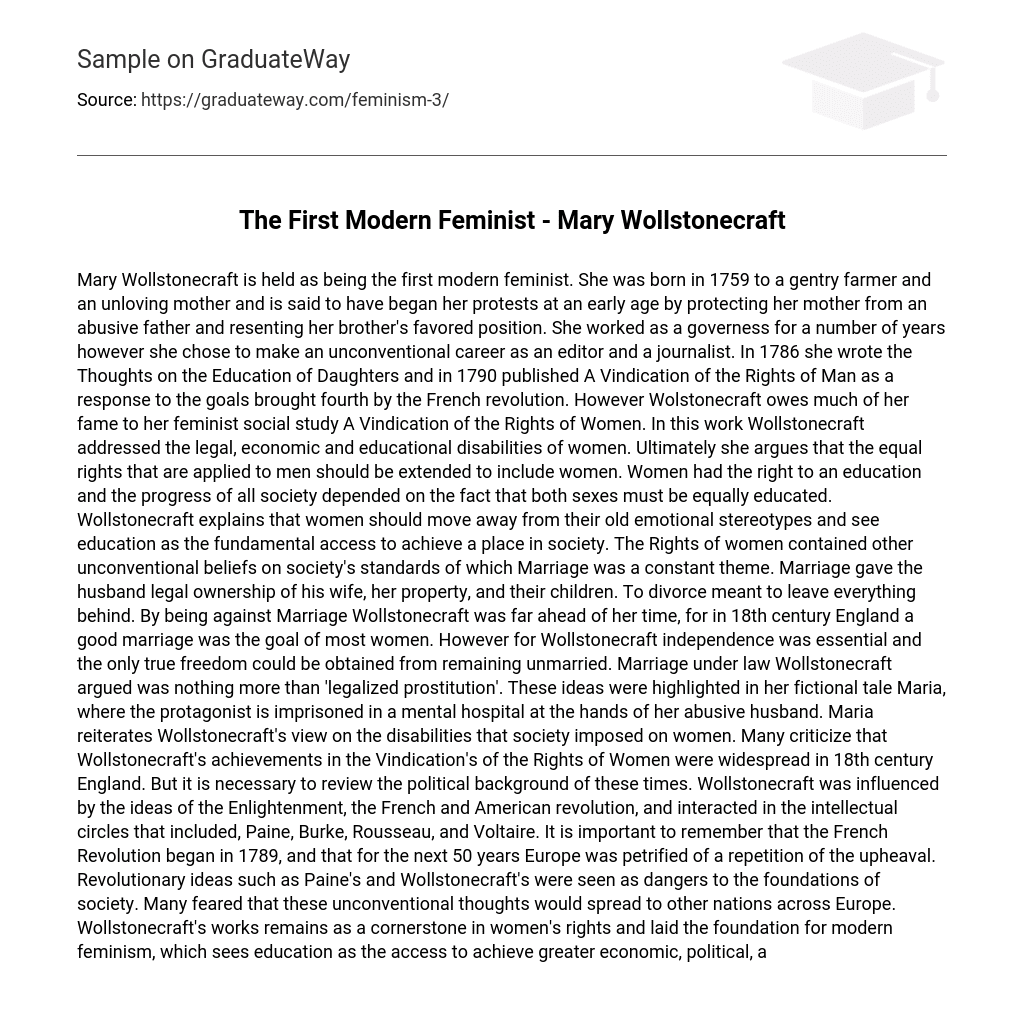Mary Wollstonecraft, hailed as the pioneer of modern feminism, was born in 1759 to a gentry farmer and a mother who lacked affection. From a young age, she displayed her activism by defending her mother against her abusive father and resenting her brother’s privileged status. Though she initially worked as a governess, she ultimately pursued an unconventional path as an editor and journalist.
In 1786, Mary Wollstonecraft authored Thoughts on the Education of Daughters. Shortly after, in 1790, she published A Vindication of the Rights of Man, in response to the goals presented by the French revolution. However, it is Wollstonecraft’s feminist social study A Vindication of the Rights of Women that propelled her to fame. In this significant work, she addressed the legal, economic, and educational disparities faced by women. Ultimately, Wollstonecraft argued for extending the same rights enjoyed by men to women. She advocated for women’s right to education and stressed that the progress of society relied on educating both genders equally.
According to Wollstonecraft, women should abandon traditional emotional stereotypes and view education as the essential means to secure a position in society. In her work “The Rights of Women,” she also challenges societal norms regarding marriage. She highlights that marriage grants husbands legal control over their wives, their property, and their children. Divorce signifies leaving everything behind.
Wollstonecraft’s perspective on marriage in 18th century England was progressive, as most women desired a successful marriage. Nevertheless, Wollstonecraft argued that independence was essential and that genuine freedom could only be attained through remaining unmarried. According to her, the institution of marriage, legally recognized, essentially amounted to legalized prostitution. These concepts were portrayed in her fictional novel Maria, where the protagonist endures mistreatment from her spouse and eventually becomes institutionalized.
Maria holds the same belief as Wollstonecraft that women were restricted by societal constraints. Some critics claim that during 18th century England, Wollstonecraft’s achievements in “A Vindication of the Rights of Women” garnered considerable recognition. However, it is crucial to consider the political climate at that time. Wollstonecraft was influenced by Enlightenment principles and found inspiration from the French and American revolutions. She actively interacted with influential intellectuals like Paine, Burke, Rousseau, and Voltaire.
It is crucial to recall that the French Revolution commenced in 1789, which caused Europe to apprehend a potential reoccurrence of turmoil during the subsequent five decades. The philosophies put forth by revolutionaries like Paine and Wollstonecraft were deemed hazardous to societal stability. The concern stemmed from the fear of these unorthodox ideas permeating other European nations.
Wollstonecraft’s contributions to women’s rights are still vital today and have paved the way for contemporary feminism, which recognizes education as a means to attain improved economic, political, and social positions. Wollstonecraft passed away in 1797 while giving birth to Mary Wollstonecraft Godwin, who would later become the renowned author Mary Shelley responsible for Frankenstein.
Despite not living long enough to witness the realization of her beliefs in women’s rights, Wollstonecraft’s vision persists through her declaration: “I have thrown down the gauntlet, it is time to restore women to their lost dignity and to make them a part of the human species.”





